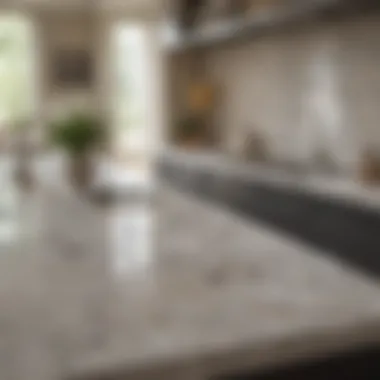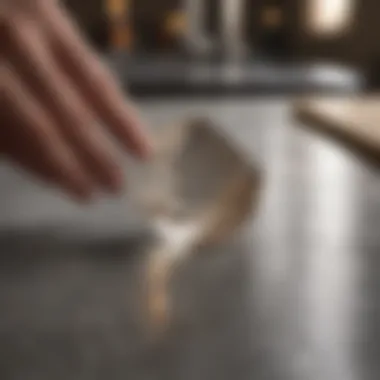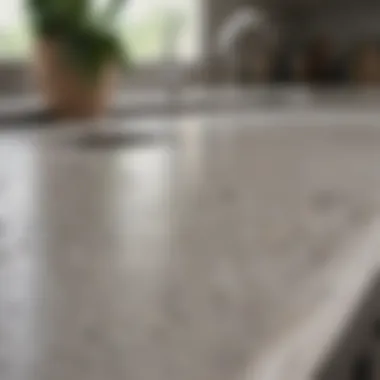Essential Care and Cleaning for Quartz Countertops


Intro
Quartz countertops are a popular choice among homeowners due to their durability and aesthetic appeal. Knowing how to properly care for and clean these surfaces is crucial for maintaining their beauty and functionality. In this article, we will explore the properties of quartz, delve into effective cleaning agents, and discuss techniques that help in preserving these surfaces. We will address common issues homeowners face and offer preventive measures to mitigate potential damage. Ultimately, our goal is to arm you with the knowledge necessary to keep your quartz countertops looking pristine for years to come.
Understanding Quartz Countertops
Before we jump into cleaning methods, it is important to understand the material itself. Quartz is an engineered stone made by combining about 90% crushed natural quartz crystals with resins and pigments. This process creates a non-porous surface that resists staining and is less prone to chipping compared to traditional stone countertops. Moreover, quartz countertops come in a variety of colors and patterns, allowing for flexibility in design.
Benefits of Quartz
- Durability: Quartz is highly resistant to scratches and impacts.
- Non-porous Surface: It does not harbor bacteria or require sealants like granite.
- Aesthetic Variety: Available in multiple colors and styles, it fits various design preferences.
- Low Maintenance: Requires minimal upkeep compared to other surface materials.
Potential Issues
While quartz is generally durable, improper care can lead to visible damage. Common problems include:
- Heat Damage: Exposure to high temperatures can cause the material to warp.
- Staining: Although it resists staining, some substances can leave marks if not cleaned promptly.
- Scratches: While resistant, using knives directly on the surface can still cause scratches.
"Proper care for quartz countertops ensures their longevity and maintains their visual appeal."
Care and Cleaning Techniques
Maintaining quartz countertops requires a systematic approach to cleaning. Follow these guidelines to keep them in optimal condition:
Daily Cleaning
- Use Mild Soap: A mixture of warm water and mild dish soap works wonders.
- Soft Cloth: Use a non-abrasive cloth to wipe the surface. Avoid rough scrubbers.
- Rinse with Water: After cleaning, rinse with water to ensure no soap residue remains.
Dealing with Stains
If stains do occur, address them promptly:
- Baking Soda Paste: For stubborn stains, mix baking soda with a bit of water to form a paste. Apply it to the stain, let it sit for a few hours, then wipe away.
- Commercial Cleaners: Certain products like StoneCare's Daily Cleaner are safe for quartz. Always check the label.
Preventive Measures
To extend the life of your quartz countertops, consider the following:
- Use Cutting Boards: Always cut on a board; avoid cutting directly on the surface.
- Heat Pads: Never place hot pots directly on quartz. Use trivets or heat-resistant mats.
- Avoid Harsh Chemicals: Do not use bleach, ammonia, or other abrasive cleansers, as they can damage the surface.
Ending
Caring for quartz countertops does not have to be complicated. With proper understanding of its properties, suitable cleaning methods, and preventive strategies, you can keep these surfaces looking great. Follow the tips discussed in this article to ensure your quartz countertops remain functional and visually appealing for years ahead.
Preamble to Quartz Countertops
Quartz countertops have gained widespread popularity in modern homes. Understanding their significance is essential for homeowners and anyone interested in interior design. These surfaces blend aesthetic appeal with practical durability. Their non-porous nature makes them resistant to stains and germs, which is a key consideration for maintaining kitchen and bathroom hygiene.
Understanding Quartz as a Material
Quartz is an engineered stone made by combining about 90-95% crushed natural quartz crystals with resins and pigments. This process creates a highly durable surface. Unlike natural stones, quartz does not require sealing. Its resilience against scratches and heat makes it suitable for high-traffic areas. Additionally, the variety of colors and patterns available allows homeowners to achieve the desired look without compromising functionality.
Benefits of Quartz Countertops
The advantages of using quartz countertops extend beyond their beauty:


- Durability: Quartz is highly resistant to scratching and chipping, making it ideal for kitchens.
- Low Maintenance: Easy to clean, requiring only mild soap and water.
- Aesthetic Flexibility: Available in numerous styles and colors, fitting various design themes.
- Hygienic: Non-porous surface limits bacterial growth, ensuring a clean cooking environment.
By choosing quartz, homeowners can enjoy a blend of performance and style. The long lifespan of these countertops adds long-term value to any home. Overall, understanding quartz and its benefits lays the foundation for effective care and cleaning practices.
Daily Maintenance of Quartz Countertops
Daily maintenance is a critical aspect of owning quartz countertops, as it ensures these surfaces remain aesthetically pleasing and functional over time. Regular care prevents the buildup of dirt and grime, inhibiting potential damage. Daily routines not only enhance the appearance of countertops, but they also prolong their lifespan. Homeowners who prioritize maintenance can avoid costly repairs and replacements; hence, understanding effective routines is essential.
Routine Cleaning Practices
Establishing a daily cleaning practice is vital for maintaining quartz countertops. These surfaces are non-porous, making them resistant to stains and bacteria, but this does not mean they are maintenance-free. Here are some key practices to incorporate:
- Wipe surfaces with a damp cloth: This removes crumbs and spills effectively.
- Use a mild dish soap mixed with warm water for general cleaning: Mild soap does not damage the surface and helps in removing stubborn stains without harsh effects.
- Immediately address spills: Quick action prevents staining, especially with liquids like wine or juice.
- Avoid abrasive pads: Using a soft cloth or sponge is sufficient for cleaning and protects the surface.
By consistently applying these practices, quartz countertops can stay clean and shiny, reflecting their quality and enhancing your kitchen or bathroom's overall appearance.
Recommended Cleaning Supplies
The right supplies play a significant role in maintaining quartz countertops. When selecting cleaning agents and tools, consider the following:
- Microfiber cloths: They are soft and effective in trapping dust and dirt without scratching the surface.
- Mild dish soap: Opt for gentle detergents that are safe for quartz surfaces. Avoid strong chemicals that can lead to damage.
- Glass cleaner: For a streak-free shine, a glass cleaner can be used on quartz countertops, but ensure it is free of ammonia, which might harm the surface over time.
- Scrapers or soft brushes: For tougher debris, these tools help lift without scratching. Make sure they are designated only for quartz.
Here are some items to keep on hand:
- Dish soap
- Glass cleaner
- A set of microfiber cloths
- Soft sponges
- Plastic scrapers
Using the right supplies and establishing a routine ensures quartz countertops remain functional and attractive. Taking this care prevents complicated issues down the road.
Deep Cleaning Techniques
Deep cleaning quartz countertops is essential for maintaining their aesthetic appeal and functionality over time. Unlike routine cleaning, deep cleaning involves a more thorough approach that tackles embedded dirt, stains, and grime that accumulate despite regular care. This section delves into the importance of implementing effective deep cleaning techniques, detailing specific methods to ensure quartz surfaces remain in optimal condition.
Stain Removal Strategies
Stains on quartz countertops can occur for various reasons. Food spills, beverages, and even cosmetic products can leave unsightly marks. Identifying the type of stain is crucial for the effective removal. To treat tough stains, consider using a mixture of baking soda and water. Apply the paste to the stain and let it sit for a few hours before wiping away.
Here are some practical stain removal techniques:
- For food stains: Use a mild dish soap and warm water solution, wiping the area with a soft cloth.
- For harder stains: A mixture of vinegar and baking soda can be useful; however, avoid excessive vinegar use, as it may dull the surface.
- For ink or dyes: Rubbing alcohol can be effective. Apply it on a cloth and gently dab the stain until it lifts.
"Quick action can prevent stains from setting in, ensuring that the countertop maintains its pristine look."
Dealing with Grease and Oil
Grease and oil can pose a challenge when it comes to cleaning quartz countertops. These substances not only leave a residue but can also make the surface appear dull and unattractive. When addressing greasy spots, using the right tools and cleaners is vital for effective results.
To remove grease and oil:
- Use warm soapy water: This method is effective for light grease. A soft cloth can aid in wiping away the residue without scratching the surface.
- Apply a degreaser: For heavier grease, select a degreasing cleaner that is safe for quartz. Follow the manufacturer’s instructions carefully.
- Avoid abrasive pads: Steel wool or scouring pads can scratch quartz, making it crucial to use non-abrasive options.
Remember, while quartz is durable, protecting its surface through proper cleaning habits is essential to avoid long-term damage.
Preventive Measures to Avoid Damage
Preventive measures are essential in maintaining the quality and appearance of quartz countertops. Despite being known for their durability, quartz surfaces can still sustain damage if not cared for properly. Taking proactive steps helps to avoid costly repairs or replacements, ensuring that your countertops remain beautiful and functional for years to come.


Using Cutting Boards
Employing cutting boards is a simple yet effective practice to protect your quartz countertops. While quartz is tougher than many natural stones, sharp knives can leave scratches over time. Using a cutting board minimizes direct contact between the blade and the countertop surface, preserving its integrity.
When selecting a cutting board, consider materials like wood or plastic. Glass cutting boards, although attractive, can be harsh on knife edges and can potentially scratch the quartz if not carefully used. Moreover, choosing the right size for your board is important; it should be large enough to accommodate your food preparations while still being easy to handle.
Avoiding Heat and Direct Burns
Heat is another enemy of quartz surfaces. While quartz can tolerate some warmth, placing hot pots or pans directly on the countertop can lead to discoloration and, in some cases, cracking. It is advisable to use trivets or mats made of heat-resistant materials whenever placing hot items on the surface.
In addition to hot cookware, be mindful of heat-generating appliances used near the countertops. The radiant heat from ovens, cooktops, or even coffee makers should be managed. Keeping a safe distance between your quartz countertops and these appliances will further ensure longevity.
Common Issues with Quartz Countertops
Understanding the common issues that can affect quartz countertops is vital for anyone who invests in this material. While quartz is praised for its durability and aesthetic appeal, it is not entirely impervious to damage. Homeowners and enthusiasts should be aware of potential problems such as scratches, surface damage, and seam discoloration. Addressing these issues promptly can prolong the life of your countertops and maintain their original charm. Not only does recognizing these problems enhance maintenance routines, but it also fosters a proactive attitude in preserving the integrity of the surfaces in your home.
Scratches and Surface Damage
Scratches can pose a significant concern for quartz countertops, which are often mistakenly believed to be scratch-proof. While quartz is tougher than many materials, it can still show signs of wear from sharp objects or abrasive cleaning tools. Even small scratches can accumulate over time, detracting from the surface's smoothness.
To minimize scratches:
- Use cutting boards consistently when preparing food.
- Avoid dragging heavy objects across the surface.
- Choose cleaning pads that are non-abrasive.
When scratches do occur, there are methods for repair. Light scratches can sometimes be buffed out with a special polish, while deeper ones may require professional restoration services. Regularly checking for surface damage enables homeowners to take timely action, ensuring that countertops remain both functional and visually pleasing.
Seam Discoloration
Seam discoloration is another common issue faced by quartz countertops. The seams are the points where two pieces of quartz are joined, and if not expertly done, they can become obvious and unsightly over time. Variable color or texture at seams can disrupt the uninterrupted flow of a countertop.
Several factors contribute to seam discoloration:
- Poor installation techniques can lead to tension at seams.
- Exposure to heat and moisture might cause adhesive materials to break down.
- Sunlight can bleach certain colors, making seams more prominent.
To avoid seam issues, it is important to engage with reputable installers who understand the nuances of quartz. Keeping an eye on seams for signs of discoloration can facilitate early intervention, improving the overall look of your countertops.
Remember, maintaining the aesthetic appeal of quartz countertops involves a mix of proactive care and awareness of these common issues.
Choosing the Right Cleaning Agents
Selecting appropriate cleaning agents for quartz countertops is crucial to maintain their appearance and longevity. The right cleaning products not only ensure that surfaces are sanitized and visually appealing but also protect the integrity of the quartz surface. This is especially important given quartz’s unique properties, blending natural stone with synthetic materials. Hence, understanding different cleaning agents can significantly impact the care routine of quartz countertops.
Chemical Cleaners: Pros and Cons
Chemical cleaners are widely available and can be effective for various types of stains and dirt.
Pros:
- Efficiency: Often, chemical cleaners offer immediate results. They target specific stains more aggressively which can be handy for tough messes.
- Sterilization: Many chemical products possess antibacterial properties. Thus, they can ensure a hygienic surface, essential in kitchen and food-preparation areas.
- Ease of Use: Most chemical cleaners are easy to apply and require minimal effort to achieve a clean surface.
Cons:
- Potential Damage: Some cleaners may contain abrasives or harsh acids that can erode or dull the finish of quartz over time. This means careful selection is essential.
- Chemical Residue: Certain cleaners can leave residues that may affect the appearance and safety of food handling surfaces.
- Environmental Concerns: Many chemical products can contribute to harmful toxins in the environment, raising concerns for eco-conscious consumers.
Natural Alternatives for Cleaning


Natural cleaning alternatives present an appealing option for many homeowners who prioritize eco-friendly cleaning methods as well as safety.
Some common natural cleaning agents include:
- Vinegar: Mildly acidic, vinegar can help dissolve and remove stains while being gentle on the surface.
- Baking Soda: This gentle abrasive can be effective for scrubbing without scratching, making it excellent for tougher marks.
- Soap and Water: A simple mixture is often enough for routine cleaning. It is safe and effective without leaving harmful residues.
Benefits:
- Safety: Natural cleaners are generally more environmentally friendly and safer for household use, especially when children or pets are present.
- Non-Toxic: These alternatives minimize chemical exposure, particularly important in cooking areas.
- Cost-Effective: Many natural cleaners can be made from common household items, saving on cleaning expenses.
Using natural cleaning products can enhance care for quartz countertops while aligning with values around safety and sustainability.
In essence, selecting the right cleaning agents is fundamental to maintaining quartz countertops. Homeowners should weigh the effectiveness of chemical cleaners against the benefits of natural alternatives to find what works best for their specific needs.
When to Seek Professional Help
Understanding when it is necessary to seek professional help is critical for maintaining the integrity of quartz countertops. Many homeowners may attempt to resolve issues themselves, believing that minor problems can be easily managed. However, there are circumstances where a lack of professional intervention can lead to increased damage and higher costs in the long run. Recognizing the signs of severe damage is paramount.
Identifying Severe Damage
There are several indicators that suggest it may be time to consult with a professional. Pay attention to the following signs:
- Deep Scratches: While minor scratches might be buffed out with the right technique, deep scratches can compromise the surface's integrity.
- Chips or Cracks: These can be more than just cosmetic issues. They might signal structural problems that require expert assessment.
- Stains That Won't Lift: Persistent stains despite your cleaning efforts could indicate a more serious issue with your countertop's finish or material.
- Discoloration: If you notice uneven color or fading, it might be a sign of damage beyond simple wear and tear.
If you notice any of these problems, it's time to consult a professional who specializes in quartz restoration. Ignoring these signs can lead to more significant issues and a decrease in the longevity of your countertops.
Professional Restoration Services
When severe damage is confirmed, professional restoration services are often the best course of action. Specialists typically offer a range of services that can help restore quartz countertops to their original state. Some key services include:
- Resurfacing: This process involves sanding down the surface to remove scratches and blemishes, making it look like new again.
- Repairing Chips and Cracks: Professionals use specialized techniques to fill in and repair chips or cracks, ensuring that the repair blends seamlessly with the surrounding material.
- Polishing: After repairs are completed, polishing helps to restore the shine, enhancing the aesthetic appeal of the countertops.
- Sealing: If the quartz has lost its protective seal, professionals can reapply it to help prevent future damage from stains or spills.
In many cases, these professional services can prolong the life of quartz countertops, preventing the need for costly replacements later.
"Preventive care is essential, but knowing when to seek expert help is equally important for quartz countertop maintenance."
Each situation is unique, so it is advisable to gather quotes and assess the experience of the service providers. This will help to ensure the best results. With informed decisions, homeowners can keep their quartz surfaces looking great for years to come.
Summary and Best Practices
The importance of establishing best practices in cleaning and maintaining quartz should not be underestimated. Regular attention to your countertops not only aids in preserving their aesthetic value but also in extending their lifespan. The guidelines herein provide clarity on effective strategies to tackle stains, prevent damage, and select appropriate cleaning agents.
Benefits of following best practices include:
- Enhanced aesthetic appeal: Consistent care ensures your counters remain visually pleasing.
- Increased durability: Adhering to recommended care decreases the risk of chips and scratches.
- Cost efficiency: Preventive measures can reduce the frequency and cost of professional repairs.
Key Takeaways for Quartz Care
For quartz countertops, a few essential points stand out. First, routine cleaning is foundational. Daily care using mild soap and warm water can stave off the accumulation of dirt and grime. Secondly, avoid harsh chemicals that may damage the resin that binds the quartz. Applying stone sealers is not necessary for quartz, as it is inherently non-porous; however, using cutting boards and trivets can prevent unwanted cuts and burns.
Additional considerations involve avoiding certain foods and substances that might leave stains, such as red wine or mustard. When spills occur, cleaning them immediately is critical in preventing lasting marks.
Long-Term Care and Maintenance Strategies
To maintain quartz countertops over the long term, adopt systematic approaches that include adopting good habits in your kitchen or workspace. Firstly, when using your countertop for food preparation, always utilize cutting boards to protect the surface. This practice is essential to minimize scratches that can occur from knives and other utensils.
Secondly, establish a schedule for deep cleaning. A thorough cleaning every few months helps combat buildup of grime that may not be visible on a daily basis. Consider using a mixture of warm water and vinegar as a safe cleaning solution. This combination effectively tackles greasy buildup without jeopardizing the integrity of the quartz.
Lastly, educate members of the household on the do’s and don'ts of quartz care, which aids in creating a shared standard of maintenance.
"Preventive maintenance is less time-consuming and costlier than repairs."







